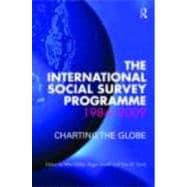
Note: Supplemental materials are not guaranteed with Rental or Used book purchases.
Purchase Benefits
What is included with this book?
| List of Tables and Figures | |
| Foreword | |
| The International Social Survey Programme. A new approach to macro-sociological comparative research | |
| The ISSP: History, organisation and members, working principles and outcomes. A historical-sociological account | |
| A breakthrough in comparative social research. ISSP compared with the Eurobarometers, EVS and ESS surveys | |
| Social and political attitudes: Class-related inequalities and the role of government. Introduction | |
| Economic Development Reduces Tolerance for Inequality: A Comparative Analysis of 30 Nations | |
| Views about a just wage compensation. Comparing temporal changes in ex-communist and never-communist countries | |
| Macro-inequalities and micro-justice | |
| Subjective Social Mobility: Data from 30 Nations - | |
| What should be the responsibility of government - Attitudinal convergence or divergence? The role of modernization and political institutions | |
| Facts and artifacts in cross-national research | |
| The case of political efficacy and trust | |
| Social, national and global attitudes and identities | |
| Introduction | |
| Social Identities in the cross-cultural perspective | |
| National pride in comparative perspective | |
| National identity in comparative perspective | |
| Shaping of National Identity in the Processes of Separation and Integration in Central and Eastern Europe | |
| Tangled paths to a world culture. Contradictory trends in attitudes to globalisation | |
| Religion, society and the state | |
| Introduction | |
| Decline of persistence of religion? Trends in religiosity among Christian societies around the world | |
| Religiosity: a comparison between Latin Europe and Latin America | |
| On the similarity of religiosity in different cultures | |
| The measurement of religious beliefs in ISSP and EVS surveys | |
| Gender roles and civic participation in family, work and society | |
| Introduction | |
| Changing public views of gender roles in seven nations, 1988 G++ 2002 | |
| Gender Empowerment, economic development and spouses G++ housework in 34 countries | |
| The role of cultural contexts in item interpretation The example of gender roles | |
| Participation in voluntary associations in Austria and Australia: How valid are the results of International Social Surveys? | |
| Preferred working hours: Variations across time and space | |
| Where's a Great Place to Work: A Global Analysis from the Perspective of a Labor Exporting Country | |
| About the Editors | |
| Table of Contents provided by Publisher. All Rights Reserved. |
The New copy of this book will include any supplemental materials advertised. Please check the title of the book to determine if it should include any access cards, study guides, lab manuals, CDs, etc.
The Used, Rental and eBook copies of this book are not guaranteed to include any supplemental materials. Typically, only the book itself is included. This is true even if the title states it includes any access cards, study guides, lab manuals, CDs, etc.